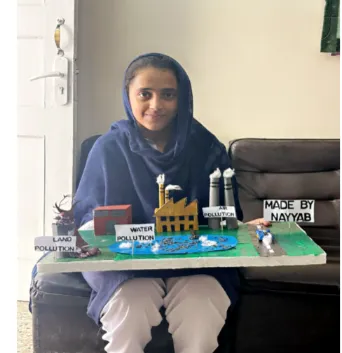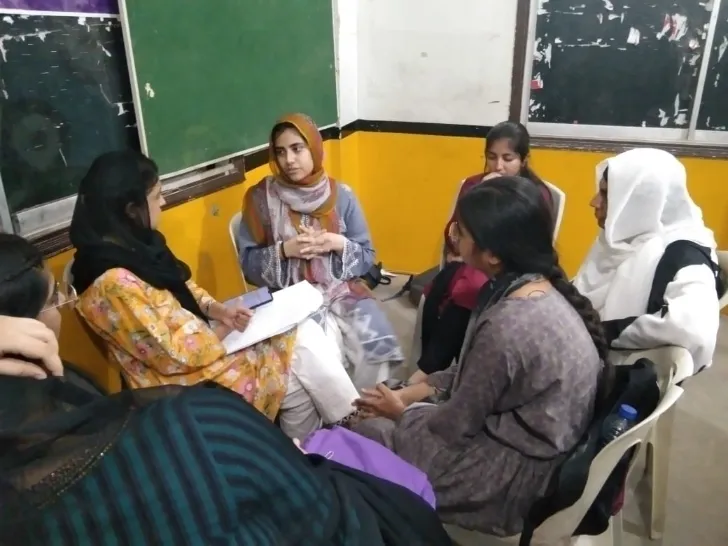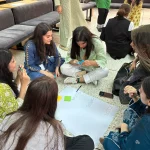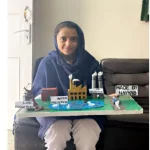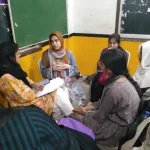Teacher: Ayesha Kareem

Ayesha Kareem
Ayesha, a Malala Fund fellow, is a passionate climate change and girls’ education advocate. She started working as an educationalist in 2017 for an NGO-run school when she was in medical school. Her work focuses on improving girls’ access to education and enhancing their skills and capacity. She has expertise in research and a special skill set in using HCD.
Her observation of the disproportionate, adverse climate impacts on girls’ education led her to design this solution. She has worked with organisations like Aga Khan University, and PYCA and is now currently leading the Girls Vision initiative at Malala Fund.
Usefull links related to the Solution
Overview
Pakistan is a country which is already enduring the effects of climate change in the form of heatwaves, unprecedented and heavy rainfalls, frequent floods, migration and food insecurity. Ayesha led a team through a human-centred design approach (HCD) to create a climate-smart curriculum which empowers girls to become resilient innovators in their communities.
Theory of Change
Girls and young women are disproportionately affected by the impacts of climate change and their education is often quickly disrupted during any form of disaster. Ayesha’s work, therefore, focuses on providing a dedicated programme for adolescent girls to enhance their knowledge, skills and capacity to address climate change effects; thus enhancing their resilience to climate change impacts, meaning there is a shift in their status from the victims of the disaster to the changemakers in their communities.
Approach and Actions
There is a severe lack of platforms for adolescent girls to voice their concerns and needs. While girls are experts in their lives, their opinions and voices are often missing from programme design, decision-making spaces and even what they need to learn in school. Bearing this in mind, Ayesha and the team at ‘Girls Leading The Change’ used a HCD approach to understand the existing knowledge of girls regarding climate change; and how it affects their lives and education. They also wished to develop a deeper understanding of the educational needs of girls; the skills they wish to learn at school; and to understand and establish the role of education in addressing climate change, finding opportunities through education for climate solutions. This approach was used to create a climate-smart curriculum designed to put girls’ voices and their needs at the centre of the initiative.
The design of the curriculum was carried out in phases. The first phase involved 14 young, climate-engaged women (aged 18-25) from different socio-economic backgrounds, receiving intensive HCD and digital skill training for four weeks. The implementation phase then started with the women using a HCD toolkit to work with girls in schools. After the implementation phase, 140 interviews were conducted with the girls who took part in the project. A climate-smart curriculum was then developed using insights from the interviews.
The curriculum was designed to include an understanding of the significance and impact of individual actions as well as that of communities. The curriculum includes aspects of climate science, including global warming, its effect and interference with humans and the environment, as well as topics like heatwaves and first aid. Storytelling techniques are used to create awareness of climate justice, girls are motivated and encouraged to share stories from their communities, and secondary-level girl students are taught more about the carbon emission and fossil fuel exploitation from developed countries that are leading to environmental damage in the global South. All the educational sessions also incorporate social and emotional learning aspects. Five schools were chosen to pilot the curriculum with teachers from these schools receiving training to support them in facilitating the lessons.
Impact
Feedback from the five schools in the pilot was collected several weeks after the curriculum sessions were completed. Ayesha and the team observed an overall improvement in climate change knowledge, especially climate science, with girls able to understand and talk more confidently about the climate crisis after completing the course. Students and teachers also successfully learnt life-saving first aid techniques. Girls living in cities – where heatwaves are common- also demonstrated that they had learnt measures that could be used to prevent heatstroke in themselves and their families. There was evidence of behavioural change in the girls and their families with a decrease in plastics recorded; more careful and monitored use of electricity; and more responsible waste management practices implemented. It was also recorded that there was an increase in the girls’ feelings of social responsibility towards climate change.

